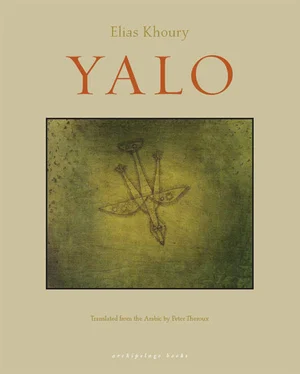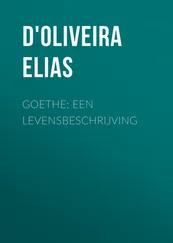The doctor said it was terror and prescribed a yellow ointment for Yalo’s head and a black liquid for him to drink every morning before breakfast for the ulcers. This was the cause of the small white puncture prominent on Yalo’s right temple, which he called his third eye.
“I have three eyes,” he told Shirin.
“How did you see me?” she asked.
“I have three eyes,” he said, and pointed to the white puncture on his temple.
“I have a white eye in my black hair, but someday when I go gray, I don’t know what will happen to this eye,” he said smiling. Shirin grimaced before letting out a smile and accepted his offer of a cup of coffee in a nearby café.
She asked him about the eye that resembled a white puncture and he told her that he didn’t remember the incident, that he had even forgotten the features of the girl who was killed. He told her he had not heard a thing — he hadn’t even heard the impact of the shell. “That is terror,” he said. “Terror is when you forget.” The young woman lit a cigarette, took a deep draw, coughed, and then the cigarette trembled in her fingers.
“So you mean to tell me that you were terrified, and that’s why you don’t remember a thing about the incident?”
“I told you I forgot because of the terror. Why don’t you believe me?”
“And why don’t you, too, believe me when I tell you I forgot everything that happened in Ballouna? You have to understand — I was terrified, too.”
“Terrified!” He repeated the word several times, softly. “But you reached out, and your arms smelled like incense.”
Had Shirin said that, or had Yalo heard, in his solitude, silence, and grief, voices coming from the depth of his imagination, meaning that he could no longer distinguish between reality and illusion?
Yalo did not tell her about the shell and the girl’s death. He said it was his third eye; a third eye only grew for those who possessed the ability to see things from their various angles, then felt the green rising from his insides up to his esophagus, so he spat on Satan, and asked her to spit. Shirin irritably put out her cigarette in her coffee cup, swallowed her own saliva, and then left.
When Gaby told the story of the navel, and cited the Epistle of Barnabas, her father told her, “Spit on Satan, daughter.” The cohno spat, and his daughter spat, and his grandson spat. But Gaby was convinced that the Epistle of Barnabas might all be false, except for the story of the navel.
Elias al-Shami said that God was the first tailor because when he ordered the angel to remove spittle from Adam’s body of clay, he also ordered him to sew a puncture in the belly of the first man. So the puncture became a navel, and the navel became the mark of man.
“Do you know, Gaby, what the navel is?” Elias said.
She was standing naked the way he liked her to be. He asked her to undress and walk naked around the workshop, then he knelt on the floor and started to kiss her navel before devouring her body with his hands.
“Do you know what navel means?” he asked her.
“Of course I know. It’s the intestine retied to the placenta.”
“No, no, Gaby, listen, my love, I’ll tell you, but this has to remain a secret between us, because the navel is the secret of man.”
Elias al-Shami rose and went into another room and then came back carrying a green book. He sat on the chair, put on his glasses, and began to turn the pages, then when he found the passage he was looking for, he said, “Listen,” and began to read:
“‘Then God said, one day when all the angels were assembled: “Let each one that takes me for his Lord straightaway bow down to this earth.” They that loved God bowed down, but Satan, with those that were of his ilk, said: “O Lord, we are spirit, it is not just that we should bow down to this clay.” Whereupon God said, “Depart from me, O ye accursed ones, for I have no mercy for you.” And Satan spat upon that mass of earth as he departed; the angel Gabriel raised up that spittle with some of the earth. So that therefore now man has a navel in his belly.’”
“Did you understand the story?” asked Elias.
She said that she understood, but he wasn’t convinced. The tailor always treated her as if she didn’t comprehend. He would tell her something, and ask her whether she understood, and when she answered yes, he would begin to repeat it. He would repeat himself several times to the point where the young woman was ready to explode, and she would gaze at him with narrowing eyes. Only then would he realize that he had gone too far, and he’d gather his sentences, shorten them, and drop his commentaries.
In this repetitive manner, Gaby learned the art of tailoring and the art of love, and all the Damascene arts that the master ascribed to his family, who left Damascus for Beirut after the massacres of 1860.
Master Elias always surprised his young love with one question: “What is the most important thing in life?”
When she gave the answer she had learned from the last time he’d asked the same question, she discovered that this time he had another answer in mind. In the beginning the most important thing in life was the art of tailoring, then it became the navel, then dogs, but in the end she wasn’t sure.
Master Elias al-Shami was infatuated with his young lover’s navel. He read to her about the navel of our lord Adam, peace be upon him, from a forged book written by an Italian monk who embraced Islam in the sixteenth century, wanting thereby to solve the complex problem that humankind invented when they had wanted to divide up God among themselves. He’d lean down then to caress and kiss her navel.
“God is indivisible,” said Elias. “That is the most important thing.”
He bent over the young woman’s navel. A small navel resembling a rose tucked into a smooth belly. He knelt and said that the navel was the first icon God made, an icon fashioned from the elimination of the stain of Satan’s spittle.
She said that she understood. She suddenly felt the need to sit down; she had been standing before him naked, listening to him explain that love was the first lesson a man received when suckling at his mother’s breast. He moved closer to her breasts, but, all of a sudden, a glacial fear came over Gaby and she said that what they were doing was a sin, the sin that her father the cohno had repeatedly discussed when talking about women: “God blessed me with only two daughters, one gone off to a faraway country and the other divorced yet not divorced, a widow yet not a widow. May God save us from sin.”
Gaby said that she went back to him after her husband had disappeared and she had given birth to her son, not for the sake of the navel or for sex, but because she felt alone and the night weighed down on her body. She went back and wanted him at night. She told him: Just one night. I want to sleep the whole night beside you in bed so that I won’t feel that the night will swallow me like an abyss.” Gaby was unable to describe to the man the signs of her fear of the night, not because she did not know how to speak, but because speech came only when the other was ready to listen. Speech. Without this readiness, it fell into the gulf that separated one human from another. That is what Yalo learned from Madame Randa. In the beginning, when his magic randified her, she never stopped talking, and he drank in her words and her love. He did not talk much because he didn’t know how to talk as she did, though her speech began to seem as if it were his. When their talking ended, their love ended. Yalo understood that a man spoke only when the other became a part of his speech. That was why Shirin left him sad. He tested her silence with his speech. He told her about his adventures, his wars, stories he had experienced and some he had not, in order to throw her a line to draw her in toward him; she approached the line, grasped the end of it, then let go.
Читать дальше












